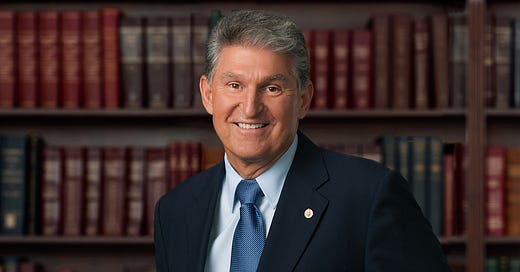I've been struck recently about the amount of animosity and vitriol directed towards West Virginia senator Joe Manchin from the left. If you read the left-wing media, you could come away with the impression that he is single-handedly preventing the progressive left from advancing their agenda. This wouldn't be the first time the media engaged in hyperbole, but it stands out because not only do I think these attacks are completely misguided, I think they are actually closer to the opposite of what's true.
I think the left would benefit from taking a cue from baseball and looking at this through the quantitative lens of sabermetrics. Sabermetrics, in its original form, is the practice of applying statistical techniques to baseball, but the underlying principles apply elsewhere as well. Among other things, sabermetrics popularized the idea of calculating "Wins Above Replacement" (WAR), meaning, the number of additional wins a player is worth over their potential replacement. If a player has a WAR of 10, it means that the team is likely to have won 10 additional games that season than had that player been replaced with the next-best person.
What does this have to do with politics? Well, can we apply the same thinking here? Sure, we won't have the precise data of baseball, but we can still ponder the same concepts. Can we determine a politician's WAR? Maybe not precisely, but let's walk through the process and see where it gets us.
How do we determine Joe Manchin's WAR? We need to answer some questions: "What is Joe Manchin (and how many wins does he provide)?" and "What is his replacement (and how many wins would they provide)?" OK, let's start with "What is Joe Manchin?" Insofar as it's relevant here, Joe Manchin is a Democratic senator from West Virginia known for being on the moderate or conservative side of the Democratic Party. How many wins does he provide? There are many ways to "win", but since this post is from a progressive viewpoint, let's measure him against a progressive yardstick.
So, what's he been in the news for recently? Well, one progressive strike against him is he's blocked Neera Tanden, President and CEO of the Center for American Progress, from becoming director of the Office of Management and Budget. But how big a deal is this? Within the grand scheme of things, this seems incredibly inconsequential. I doubt anyone will remember this in a year. Yet it led to a fury of vitriol from the left, including accusations of sexism and racism. He's also gotten flak for being in opposition to Medicare For All, defunding the police, changing the filibuster rule, the $15 an hour minimum wage increase (he prefers $11 an hour). I'm sure other things that I'm forgetting, but I think this gives enough of an idea.
The other big news is the stimulus. Manchin made headlines for changes which were, in my opinion, not insignificant but also not huge relative to the size of the bill. However, HE VOTED FOR THE $1.9 TRILLION STIMULUS BILL. The vote on this bill was 50-50 with Kamala Harris breaking the tie, so every vote was needed. The significance of voting to pass the stimulus blows the other stuff out of the water.
Overall, what are his progressive wins? Well, on the most important issues (in my opinion) he has voted with the progressive side. However, on many other issues, he hasn't. So maybe overall I would rate him as good-to-moderate.
What's Joe Manchin's replacement? I don't think there will be any disagreement here when I say it's not some other Democrat. There's no chance in a world where Joe Manchin didn't exist that the senator from West Virginia would be in the Democratic Party. So, how many wins would progressives have gotten from his replacement? Maybe the best thing to do would assume his replacement is similar to the other senator from West Virginia, Shelley Moore Capito. According to 538's Trump score tracker, she voted with Donald Trump over 90% of the time, even more than her predicted amount. As far as progressive wins go, I think we can assume Joe Manchin's replacement would be a fail. The difference between moderate-good and a complete fail is quite a lot, so, in terms of WAR, Joe Manchin's numbers are incredibly high.
Let's compare his WAR to that of the progressive icon Alexandria Ocasio-Cortez. She's a consistent progressive voice who has done much to push the party towards more progressive policies. Her progressive credentials are solid and she has done much to excite progressive voters around her agenda. She definitely gets top marks for progressive wins.
This is certainly a great value, but what's her replacement? Her replacement is fairly obvious, in that it's the person she replaced in The House, Congressman Joe Crowley. Crowley was Chair of the House Democratic Caucus and although he had little of AOC's ability to capture media attention or gen-up excitement about progressive policies, he was undoubtedly a solid Democrat who voted for progressive causes. So although he might not be AOC-level, he still gets an excellent score for progressive votes. So although AOC is a strong leader in progressive causes, her actual WAR for progressive policies isn't very high.
It's not so much that AOC's WAR is low, because I think it's low for most members of Congress (that's kind of a feature of democracy). It's that by my (rough) calculations, Joe Manchin's WAR for progressive policies is the highest in Congress. In fact, it's leaps and bounds beyond that of anyone else in American politics. So, given that, I think the left should lay off him a bit and maybe make sure they do what's necessary to keep him around.



